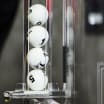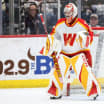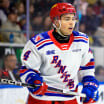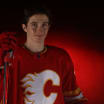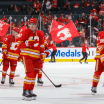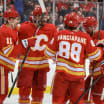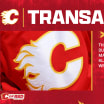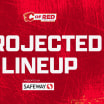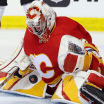Surrounded by cameras and inquisitors armed with voice recorders, interlopers brandishing microphones, Matthew Tkachuk hung in as resolutely as he does in front of opposition nets.
Another goal, a helper and raised his usual rumpus as his Flames had just trimmed the Dallas Stars 3-1. Shook off a wicked shot to the back of the neck in the bargain.
FLAMES EXTRA - THE NEW GUYS
Tkachuk just latest in long line of stellar Flames rookies
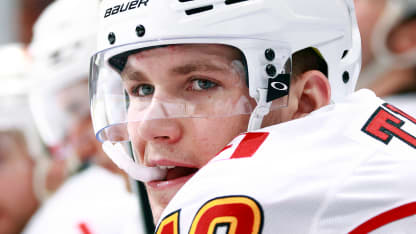
By
GEORGE JOHNSON @GJohnsonFlames / calgaryflames.com
All in a night's work.
A few feet away, the beating heart of the team took in the scene with a kind of bemused admiration.
"This guy, what he does …,'' marvelled Mark Giordano, "yeah, it's impressive.
"He's got confidence but in a good way. Not cocky. Just a cool kid to be around.
"That's the difference. You get some young guys, they show up full of themselves. In the room, Chucky's just a polite, respectful kid.
"Put him on the ice, though, and he's not intimidated by anybody. I'll tell you what, when I was his age I was still intimidated by some of the big names in junior. So for him to come in the NHL and exude that confidence, to step right in and really contribute.
"I can't say enough good things about him."
In a blue-chip season for rookies, an Austen Matthews-Patrick Laine-Mitch Marner-Zach Werenski-William Nylander year, the Calder Trophy crop is exceptional.
The competition for the hardware a fella can only win once in a career will be fierce.
Tkachuk ranks fourth on the Flames in points (46), second in assists (33), and is a +14. League-wide among freshmen, (as of Sunday morning) he was tied for fifth in points, third in assists and second in plus-minus.
No matter how the Calder voting shakes down, the former London Knights' star joins a lengthy list of first-year Flames who've made an immediate, often indelible, impact.
From the franchise's initial two Calder Trophy recipients, Eric Vail ('74-75) and Willi Plett ('76-77) of the Atlanta years, the organization can rightfully reflect on a rich history of top-drawer freshmen.
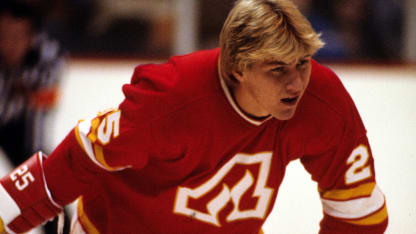
Since relocating north in 1980, the list of trophy-recognized rookies includes three Calder winners - Gary Suter, Joe Nieuwendyk and Sergei Makarov - and an additional trio of Top-3 finalists - Jarome Iginla, Dion Phaneuf and Johnny Gaudreau.
And oh so many more.
In '83-84, Hakan Loob arrived from Sweden and scored 30 in his debut bow. Czech centre Robert Reichel accumulated 88 points over his first season. Sean Monahan displayed a two-way savvy beyond teenage expectation when he hopped aboard.
Through the passing years, nine Flames - Jamie Macoun, Loob, Suter, Nieuwendyk, Makarov, Iginla, Derek Morris, Phaneuf and Gaudreau - were selected to the NHL All-Rookie Team.
Often times, players who go on to glittering careers, by a combination of circumstance - acclimatization to the pros, particularly stiff rookie competition that year - don't get so much as a Calder sniff.
Al MacInnis, for instance, would enjoy a Hall of Fame tenure, cracked the NHL's Top 100 Century list, and is justly regarded as this franchise's best-ever defenceman.
Back in 1983-84, his rookie season was considered a success - 11 goals and 45 points.
But that year Buffalo goaltender Tom Barrasso (26 wins, 2.84 GAA) would land the Calder, ahead of fellow finalists Steve Yzerman and Pierre Turgeon.
Not a bad crop to choose from.
Flames' icon Theoren Fleury, meanwhile, was a mid-season call-up from the IHL Salt Lake Golden Eagles in early 1989, perfect timing for the Stanley Cup run but leaving him only 36 regular-season games of sample-size, not nearly enough to make him a viable Calder candidate.
By comparison, Rangers' defenceman Brian Leetch, the winner, suited up 68 times. Vancouver's Trevor Linden and Leetch's New York teammate Tony Granato were the other finalists that year.
Following the move north from Georgia, it took half a dozen-seasons, until the summer of 1986, for a Flame to lift a chunk of major individual hardware.
Naturally, it'd be a Calder Trophy.
A year after being a ninth-round draft pick, 180th overall, off the University of Wisconsin campus, a solidly put-together, strong-skating D-man arrived en scene in the fall of 1985 with little fanfare.
When training camp opened in September, there were no indications that Gary Suter would even stick in Calgary, let alone make a meaningful contribution.
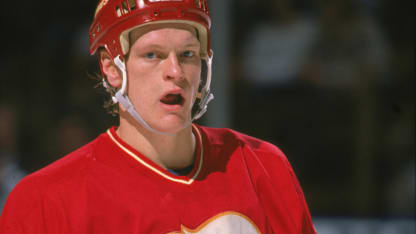
He'd left college early to make the jump to the pros. It had been, he later admitted, a leap-of-faith roll of the dice.
"That whole year,'' Suter recalls, "was magical for me. I came in hoping to make the team. Had a good camp. Did real well in the fitness testing. Then Badger Bob put me on the powerplay right away. And MacInnis and I clicked, almost instantly.
"Everything went right. Just being in the league, going into all those new buildings … such an adrenalin rush. It kinda snowballed for me."
Suter's numbers that year - 68 points, tied for fifth on the team alongside his powerplay point partner MacInnis - were mighty impressive.
In southern Alberta, performance level against the hated then Cup-champs is always a barometer of success or failure.
nd Suter, the kid, actually led Calgary, stockpiling 12 regular-season points against Gretzky, Messier and Co.
"He created,'' recalls his pal and 5-on-5 defence mate Neil Sheehy, "a dimension we didn't have. He could really skate. Hey, (Paul) Reinhart was skilled but he wasn't a great skater. Sutes got the puck and he'd … go.
"I'd say 'Hey, I've got it covered back here.' He had such great ability, he'd just take it from there."
Even so, the odds on the 22-year-old actually winning the Calder seemed remote.
After all, fractious left-winger Wendel Clark had the might of the Eastern media behind him, was a No.-1 overall selection, had a Toronto Maple Leaf logo on the front of his jersey, had changed positions (defence to the port side) in the transfer to pro and had freshly-minted Canadian world junior championship gold-medal raves in his scrapbook.
Clark scored goals (34), fought (227 PIM) and was showered in that reverential Hogtown limelight.
But Suter's all-around game and the increased degree of difficulty of the position for a rookie were enough to sway Professional Hockey Writers Association voters.
And in the final analysis, the balloting wasn't even close: Suter compiled 230 points on 35 first-place votes to runner-up Clark's 165 points.
Only one season removed from Suter's impressive debut, another first-year U.S.-college trained player would set the hockey world on its ear.
At the start, nobody could so much pronounce (or spell it on deadline) the name of Joe Nieuwendyk. The pro-Kent Nilsson faction here in town was still bleating about trading the Magic Man for a draft pick no one in Calgary had ever heard of.
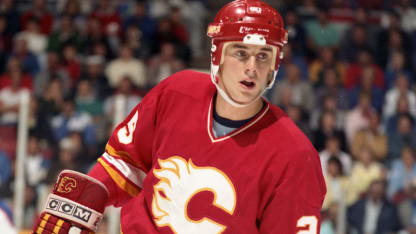
Niewuendyk was actually Calgary's second pick in the 1985 draft. Defenceman Chris Biotti - who would retire after three seasons in IHL Salt Lake, never having played an NHL game - had been taken ahead of him.
No matter. The rangy centre out of Cornell with the deft hands of a Swiss clockmaker would chase N.Y. Islander legend Mike Bossy's rookie goal record of 53 right down to the wire, shooting blanks through the final eight starts to fall only two tallies shy.
Consider, though, that his 51 ranked fifth among all players, he led the loop in powerplay goals (31) and finished tied for third in game-winners (8).
In Calder balloting, Buffalo winger Ray Sheppard and Chicago goaltender Darren Pang, the other finalists, didn't stand a chance.
"An ideal place to be a young player,'' Nieuwendyk says today of being nurtured in Calgary. "No question. I think if you asked Monahan and Gaudreau and those kids, they'd say the same thing today. I'm sure that hasn't changed.
"Starting with the owners, Harley and Becky (Hotchkiss), the Seamans, Norm Kwong, Sonia (Scurfield) … it was a family atmosphere. People like Lanny and Pep and Timmy Hunter, they embraced me, made me feel so comfortable.
"Great environment. Great city. I was lucky."
Certainly the most controversial Calder winner proved to be Sergei Makarov, brough over by GM Cliff Fletcher in the fall of 1989, as the Flames readied to defend their Stanley Cup title.
At 32, Makarov was already a world star, a part of the peerless KLM Line with Moscow Red Army and the Soviet National Team. Critics argued that Makarov was a veteran and certainly no rookie.
The Calder rule, however, stated that any first-year player was eligible for the award.
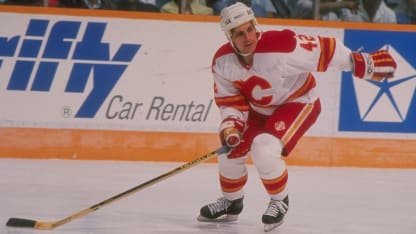
With 86 points, he topped a rookie scoring list that also included the far younger Mike Modano (75), Mark Recchi (67), Jeremy Roenick (66) and Rod Brind'Amour (61).
Makarov refused to be caught up in the tempest.
"I feel the same away about (the Calder) as I have all season,'' he reiterated as the regular-season came to a close. "It is not my decision. It is the writers'."
At the awards ceremony, he lifted the Calder, instituting a revision of the rule to exclude any players over the age of 25.
The Makarov influence here was immense.
"He had the vision of a Gretzky,'' reminisced centre Joel Otto earlier this year. "At times he saw the ice very slowly, at a speed most of us can't. So strong, too. A horse, a rock, in terms of corner battles
"And he may have been older then but there was still this burning desire inside him to excel.
"One of the top-five skilled guys, competitors that I was fortunate enough to play with."
The next great rookie would enjoy an unparalleled career here. In the famous deal that shipped Nieuwendyk to Dallas, the Flames would add a Stars' draft pick who would go on to become their greatest-ever player.
After a two-game playoff introduction in the spring of '96, Jarome Iginla's first regulation season would net 50 points, including 21 goals, good for fourth among Flames' scorers.
Although named a '97 Calder finalist, he finished behind 48-point N.Y. Islanders defenceman Bryan Berard and ahead of 23-goal right winger Jamie Campbell of the St. Louis Blues in balloting.
A goal-less drought in the final 17 games and Calgary's record-setting 41-loss season didn't help his cause any.
The organization's next rookie super nova didn't materialize until 2005. Dion Phaneuf arrived from the WHL's Red Deer Rebels with a prodigious appetite for contact .
Unfortunately for Phaneuf, the rookie Class of 2006 also included a couple of generational talents: Alex Ovechkin and Sidney Crosby.
Ovechkin finished third in scoring with 106 points, Crosby sixth at 102.
In Calder voting, the Caps' ornery sniper would rule the day, receiving 124 of 129 first-place ballots, 1,275 in total as opposed to 831 for Crosby and 580 for Phaneuf, a distant third.
How solid a favourite was Ovie? Well, hours before sauntering up to collect his booty, EA Sports announced that The Great 8 would be the cover boy for its NHL-07 video game.
Phaneuf, however, could console himself with the fact that he'd nonetheless finished ahead of a slew of rivals who'd develop into bonafide NHL stars: Goaltenders Henrik Lundqvist and Ryan Miller, centre Jeff Carter, and defencemen Ryan Suter and Brent Seabrook, among others.
As the organization began to retool, more and more bright prospects made their rookie turns. Smooth-skating defenceman T.J. Brodie made the grade in 2012. The next summer, the Flames' chose Ottawa 67's star pivot Sean Monahan using the sixth-overall pick. Monahan would stick with the Flames that winter and tally 22 goals and 34 points through 75 starts.
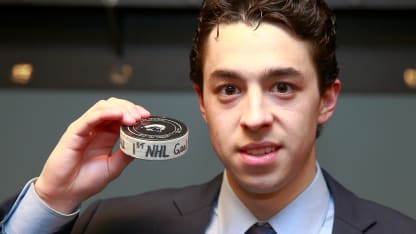
A season removed from Monahan's arrival, a wee wizard climbed aboard who would set the city alight like few others.
Johnny Gaudreau had announced his arrival.
A Calder winner of another era, Nieuwendyk, heralded the former Boston College's star's pizzazz.
"Johnny Gaudreau reminds me a little bit of Theo (Fleury) when he first came up,'' lauded Joe Who. "Something different. Johnny has that Wow! factor, too."
Gaudreau would finish a remarkable season tied for second in rookie scoring alongside Ottawa's Mark Stone, at 64 points. Both would be outpolled in the Calder, though, by Florida D-man Aaron Ekblad.
"He has a gift of knowing when to pass the puck, when to keep it, when to attract people, how to create separation,'' marvelled Flames' assistant coach Martin Gelinas.
"And that Wow! factor you're talking about ... I mean, even we're sitting there going 'Wow!' He's got that confidence, that gift. Creativity. Imagination.
"A comparison? He's a mix of a lot of guys. At the end of the day, he has that Wow! factor because he has to. He's not a big guy.
He isn't going to drive people through the boards or overpower them in front of the net. But he makes things happen. Incredible things."
Brodie, Monahan and Gaudreau would be joined by the highest-ever draft pick in franchise history, Sam Bennett, taken fourth in the 2014 draft. He'd contribute 36 points in his freshman campaign.
From Nieuwendyk to Gaudreau, Suter to Phaneuf, Makarov to Iginla, Loob to Monahan to Bennett.
And now, add Tkachuk to the list.
Great names. Great numbers. Great freshmen.
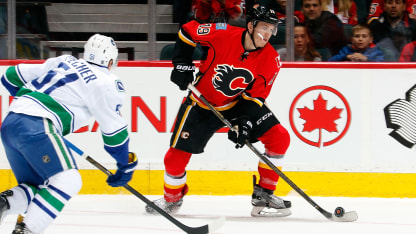
"It's amazing what some of these young guys can do,'' Mark Giordano said the other night, post-Dallas victory.
"Look at Chucky. At the bluelines he's great, defensively he's really, really aware and in the offensive zone he creates havoc. He scores, hits, draws penalties. What else can you ask for?
"He's going to be big, big part around here for a lot of years to come.
"For a rookie, he's done an amazing job for this team."
Welcome to an illustrious queue, kid.

